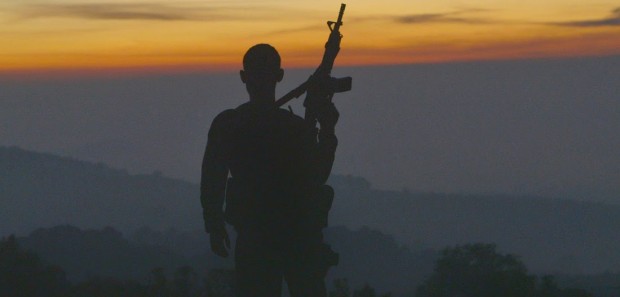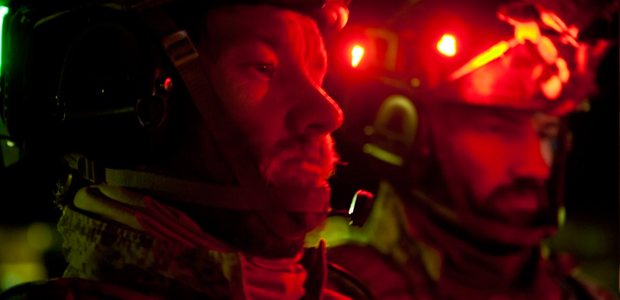
Arriving in limited release this weekend before expanding wide in early October, Denis Villeneuve‘s Sicario is a strong start to the fall season. The drama surrounding the drug battle at the U.S.-Mexico border might not get any points for subtlety, but Villeneuve amplifies the tension of every scene with help from cinematographer Roger Deakins outdoing himself with every shot.
If it’s not coming to your city this weekend, or if you’re simply in the mood for some similarly themed films, we’ve rounded up eight titles that are well worth watching before seeing Sicario. Rather than including past work from Villeneuve (Prisoners and Enemy make for worthy primers) or proof that Emily Blunt makes an excellent heroine (see: Edge of Tomorrow and Looper), the selections aim to cover a thematic crossroads. Check them out below and let us know your thoughts in the comments.
Cartel Land (Matthew Heineman)

For those looking for a real-life account of the Mexican Drug War, this summer delivered an unparalleled look at both sides with Cartel Land. We said in our review, “Following in the footsteps of the late, great, cinematic badass Michael Glawogger, whose work often put him on the front-lines of the most dangerous jobs (or at the very least unsavory situations), Cartel Land finds a certain humanity in the work of militias on both sides of the U.S.-Mexico border cartel fights. Directed, produced and filmed by Matthew Heineman, the documentary dives deep into vigilante culture, chronicling the struggles of the Autodefensas, an organized militia who takes up arms against the Knights Templar. On the U.S. side of the border in Arizona’s Altar Valley, Tim “Nailer” Foley heads the Arizona Border Recon, a group that patrols the Valley, turning over smugglers and their advance men to US.. Customs and Border Patrol. The approaches are similar while the motivations of each are complex; Nailer and crew’s story is overshadowed in Cartel Land by the compelling, immediate on-the-ground reporting of its Mexican passages.”
The Counselor (Ridley Scott)

While Sicario is intense from start to finish thanks to its top-notch direction, editing and cinematography, if there’s a qualm to be had it’s in Taylor Sheridan‘s heavy-handed, often rhetorical script. Despite how one might feel about The Counselor, the same certainly can’t be said for Cormac McCarthy‘s atypically eccentric work. Derided by most critics and audiences (it was awarded the prestigious “D” CinemaScore rating) upon its release a few years ago, I found it to be one of Ridley Scott‘s better films. As a boldly grim look at the Mexican-American drug trade and what happens when one man gets in over his head, Sicario could’ve used a bit more of McCarthy’s poetic bite when examining this cartel warfare.
El Norte (Gregory Nava)

A far more modest feature then Villeneuve’s highly stylized thriller, Gregory Nava‘s Oscar-nominated El Norte is a deeply affecting drama told in three distinct parts about the immigration journey and its aftermath. Taking place decades before Sicario, it follows Zaide Silvia Gutiérrez and David Villalpando (in their debut roles) as they travel from Guatemala to the United States through Mexico. In one of the film’s most harrowing sequences, the pair make their claustrophobic way through a rat-filled pipe to reach freedom; Sicario‘s climax features a similarly-located mission in the opposite direction, and both films end on quite a grim note.
Miss Bala (Gerardo Naranjo)

One of the most elegantly-shot international thrillers as of late, Gerardo Naranjo‘s Miss Bala seemed to be overlooked upon its initial release, but it’s well worth catching up on before heading into Sicario. Telling the story of an aspiring beauty queen (Stephanie Sigman, one of Spectre‘s Bond girls) who becomes entangled with a gang while attempting to enter a pageant, it’s an intense ride not unlike Villeneuve’s latest. Captured from a narrow perspective, like Sicario, both are ultimately traumatic experiences that show the never-ending cycle of violence when it comes to the War on Drugs.
No Country For Old Men (Joel and Ethan Coen)

The second Cormac McCarthy film we’ve mentioned, there’s little more to be said about the Coens‘ Best Picture-winning No Country For Old Men, but for those looking for a similarly intense thriller set around the Mexican border, Sicario will deliver. Both helped by immaculate cinematography from Roger Deakins and a compelling performance by Josh Brolin (showing off his comedic chops in unexpected ways), each production also ran into a similar problem; Deakins recently told Variety that due to security measures key sequences at the border crossing in both films had to be restaged at a different location in the United States.
Sin Nombre (Cary Fukunaga)

While Sicario has a half-hearted attempt to portray the Mexican perspective of the violence in the country, Cary Fukunaga immerses us into it with his accomplished debut. Much like he does with his latest feature, Beasts of No Nation, Sin Nombre is a seemingly authentic portrait of a perilous environment. The drama tells two stories, one of gangster life and one of immigration, eventually colliding together. Much like Villeneuve and Deakins’ work on Sicario, Fukunaga and cinematographer Adriano Goldman paint a lush, vivid portrait of Mexico, going back and forth between the uncompromising urban life and the astonishing Mexican terrain.
Traffic (Steven Soderbergh)

Plunging back into the world of drug trade — and the violence that accompanies it — Benicio del Toro‘s character of Alejandro in Sicario is a mysterious figure, occupying the shadows painted by Deakins. Harkening back to his Traffic character, police officer Javier Rodriguez, each are attempting to move the needle of the drug war, despite having vastly different motives. Before experiencing the intense, singularly focused Sicario, Soderbergh’s multi-layered story would make for an ideal viewing to see the various machinations of the system. Although the ending of Traffic paints a far more hopeful picture than that of Sicario, the fact that the drug war is as turbulent as ever tells us which film is more accurate in its message.
Zero Dark Thirty (Kathryn Bigelow)

Despite taking place on different sides of the world, the latest thrillers from Kathryn Bigelow and Denis Villeneuve feature similarly styled climaxes, but the comparisons don’t end there. As we said in our review, “Psychologically, by situating an idealistic heroine at the heart of a militarized manhunt and forcing her to confront its sordid ethical realities, Sicario clearly aims to be the Mexican drug war’s Zero Dark Thirty (also on a visual level Villeneuve borrows a lot from Kathryn Bigelow’s film, for example a lengthy night-time ambush rendered in night-vision).” When compared to Jessica Chastain‘s character, Blunt’s Kate Macer might feel more like a pawn in the overall plot, but each questions the methods used for making the country safer, and if certain actions taken even have an effect at all.
Sicario opens in limited release on September 18th and expands wide on October 2nd.
Were any of your favorites mentioned? What would you add?

